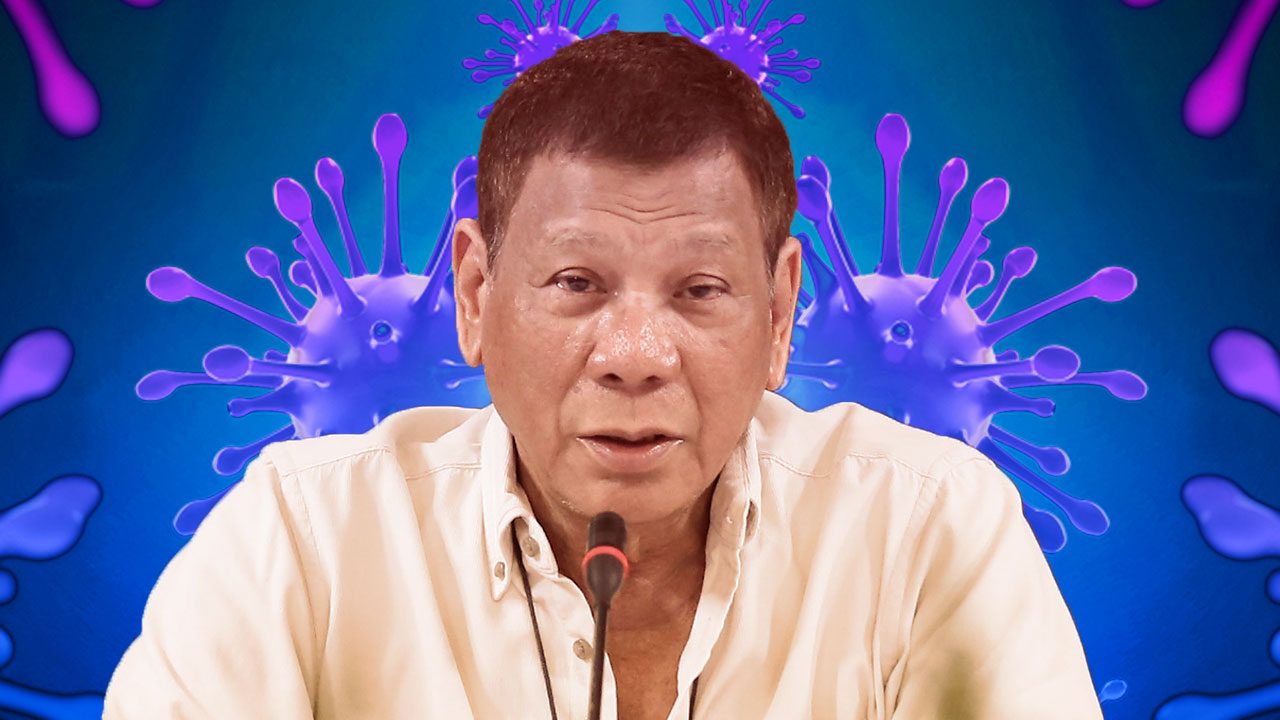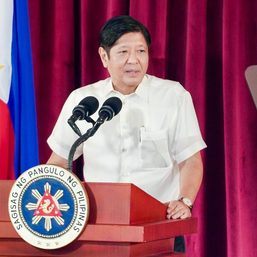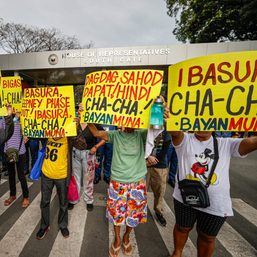SUMMARY
This is AI generated summarization, which may have errors. For context, always refer to the full article.

Despite his administration’s poor response to the coronavirus pandemic, President Rodrigo Duterte continued to receive high performance and trust ratings, solidifying his “Teflon status” and surprising even political pundits. (READ: Pandemic unravels Duterte’s 2016 promise of decisive leadership)
Duterte got a 91% approval rating in the recent Pulse Asia Ulat ng Bayan survey – the first major nationwide survey during the pandemic. This is 4 percentage points higher than the 87% he recorded in December 2019. Only 5% disapproved of Duterte, while 5% were undecided.
Duterte also got a 91% trust rating, 8 percentage points higher than in December 2019. Only 3% said they don’t trust the President, while 5% said they were undecided.
Duterte’s numbers would appear to paint a rosy picture of the country. The reality, however, is far from it. (READ: Coronavirus drives Philippines toward recession as Duterte’s 4th year ends)
The Philippines is the worst-performing country in Southeast Asia in battling the pandemic. The Philippines also recently made it to the Top 20 countries with the highest number of confirmed coronavirus cases.
Rappler talked to Pulse Asia Research Director Ana Maria Tabunda and University of the Philippines political analysts Aries Arugay and Jean Franco to make sense of this political phenomenon.
“I was puzzled. It’s bizarre,” Arugay told Rappler.
Timing of survey
In an interview with Rappler, Tabunda said the timing of the survey could explain the positive results for Duterte.
The survey was conducted nationwide from September 11 to 20, at a time when most areas were placed under general community quarantine (GCQ) or under modified GCQ.
The period, however, saw a high increase of confirmed cases, with more than 3,000 to nearly 5,000 cases daily.
“For one thing, the survey was conducted during GCQ and MGCQ which was when the conditions were less stringent. People might feel less constrained by then, that’s one,” Tabunda said in a phone interview.
Under GCQ, people are allowed to move around for work and essential services. Under modified GCQ, movement goes back to normal but mask-wearing, physical distancing, and other health protocols are enforced.
Risk consultant Bob Herrera Lim said the current situation has prompted the public to somehow adjust their priorities, given the loss and danger everywhere.
“I think the difference right now is there’s this broad fear that this is a pandemic so people I think moved the ‘Am I still alive? Is my family still okay?’ up the scale in terms of just saying, ‘As long as I’m fine, yes I don’t have a job, yes we’ve had to depend on government handouts,'” he said in a forum organized by the Foreign Correspondents Association of the Philippines (FOCAP).
“All these things are all the negatives that in any other situation might have knocked his numbers down but I think just the overwhelming fear and again you see that in the other survey numbers of the pandemic caused people to think okay I will overweight my survival vs all these other variables which in normal times would have mattered,” he said.
Government cash aid
Tabunda, Arugay, and Franco all believe that the government’s cash subsidy program influenced respondents’ positive views of Duterte.
Franco said the money, after all, was a tangible form of assistance directly felt by the people.
“The many families we surveyed received cash transfers and cash subsidies. I supposed that help. They are generally approving of the way the administration is handling the pandemic,” Tabunda said.
The aid, initially dubbed social amelioration program, was so effective that it made Duterte get the highest increase, at 11%, from the poorest socio-economic sector – Class E. He got an increase of 2% from Class D, and a decrease of -1 from Class ABC or the wealthiest sector.
“Remember the [cash aid] was given nationwide. It became a dole out, so there was tangible material incentives from the crisis. He received the biggest push from Class E,” Arugay told Rappler.
The subsidy program, however, was far from perfect with many delays and issues.
No-one-can-do-it, ‘rally-around-the-flag’ mindset
Another reason could be the mindset that no one, not even global superpowers, could control the pandemic.
“People attribute the difficulties they experience to the pandemic rather than to the failure of the government. They probably think there are other countries who have it worse than the Philippines and it’s out of control of the government,” Tabunda said.
Franco shared the same sentiment, saying US President Donald Trump’s mishandling of the pandemic did not help change this view.
“They could say, the US wasn’t able to control it, they’re a Superpower, how much more the Philippines, a developing country with no budget, poor health care system. So they might be thinking: Why judge Duterte for something that others cannot address?” Franco said in a mix of English and Filipino.
Arugay described this using a political science concept – “rallying around the flag” especially during times of crises. This, too, was evident after the Marawi siege, where Duterte got huge public support.
“Crises call for unity to address the threat and the incumbent is the leader to call for this unity. The incumbent has all the resources and tools for crisis response,” Arugay said.
He also said Duterte continues to enjoy high ratings despite blunders because the public thinks “there is no alternative.”
Duterte’s press briefings
For Franco, Duterte’s televised briefings every Monday night – despite the lack of coherence and direction – have helped his image.
“Because of the pandemic, very regular din ang appearance of Duterte, even if sometimes it’s a relay. It must have strengthened his political base to rally behind the President. In these uncertain times, the only thing that can give them certainty is the government,” Franco said.
Rappler earlier looked into Duterte’s COVID-19 messaging and found that over half of his speeches have been musings and warnings about the pandemic but only a quarter have been clear directives. (READ: 56,000 words on the virus: Duterte’s crisis messaging all bluster, little science)
Rappler’s analysis showed that Duterte curses more frequently than he mentions COVID-19 “testing.”
Lack of freedom, Duterte’s teflon status
Duterte has always managed to shield himself from controversies hounding his people.
Despite the multibillion PhilHealth corruption during the pandemic, Duterte has been able to get away unscathed.
“It has always been the case that the President doesn’t seem to be affected by any corruption charges or accusation involving officials under him. [The people] don’t think he’s part of it,” Tabunda said.
Asked why, Tabunda cited lack of freedom to express “negative” sentiments in the current government.
“I suppose they really credit achievements in the anti-illegal drug campaign, that’s one possible answer. And also I think there was more freedom in the past. It’s very difficult right now to present negative assessments for the public,” she said.
The government has invested in online machinery to push propaganda and drown out dissent and criticisms on social media. Philippine media giant ABS-CBN was also shut down, following threats from the President himself.
Fear
For his part, sociologist Randy David said another reason could be people’s fear of the government. At this crucial time, the public would not want to lose assistance from the government.
“One need not go to the country’s remotest barangays to find people who would readily give “safe” answers than say something that could expose them to unwanted drug raids or to being denied “ayuda.” To people who have felt vulnerable and powerless all their lives—and they are the majority in our country – nothing could be more dangerous than expressing their true opinion about their leaders at the wrong time,” David said in his column published on Sunday, October 11.
Political science expert Richard Heydarian shared the same sentiment. He surmised that there is lack of incentive for the public to be honest about their opinions.
“What’s the incentive of people to be completely honest about whether they like or dislike a person? The climate of fear cannot be taken out as a factor,” Heydarian said in the FOCAP forum.
Herd immunity, fake news
A working paper written in January 2020 by Tristan Canare of the Asian Institute of Management, Ateneo School of Government (ASoG) Dean Ronald Mendoza, Leo Jaminola, and Jurel Yap of ASoG found evidence of “herd behavior,” meaning “individual perceptions of the group’s satisfaction appeared to be linked to their own answer or satisfaction.”
The study suggested that those who were satisfied with Duterte’s performance also generally have access to sources of news and information. However, the authors said this did not mean they were spared from disinformation – something rampant under the administration. (READ: Coronavirus response: Online outrage drowns out Duterte propaganda machine)
The study also found partial evidence that presidential support may be affected by “fake news” or disinformation. However, the authors said that these results do not discount the risks of false information, since other studies revealed citizens may mistrust true stories and regard them as false, and vice versa.
With all these, Tabunda said Duterte’s ratings will not go down any time soon, as the President continues to defy norms and expectations of a leader already halfway through his term.
“I don’t think the President’s ratings would be going down. It was high, in the 80s for several years, and now it’s still high. I don’t see it coming down… It’s really different for him,” Tabunda said.
Franco, for her part, said Duterte’s ratings show he will not be a lame duck president any time soon.
“That will be his leverage,” she said. – with reports from Pia Ranada / Rappler.com
Add a comment
How does this make you feel?
![[EDITORIAL] Kapag bumabagsak ang ratings, balikan ang basics](https://www.rappler.com/tachyon/2024/04/animated-bongbong-marcos-sara-duterte-popularity-numbers-2024-carousel.jpg?resize=257%2C257&crop_strategy=attention)
![[OPINION] Can Marcos survive a voters’ revolt in 2025?](https://www.rappler.com/tachyon/2024/04/tl-voters-revolt-04042024.jpg?resize=257%2C257&crop=251px%2C0px%2C720px%2C720px)




![[The Slingshot] Alden Delvo’s birthday](https://www.rappler.com/tachyon/2024/04/tl-alden-delvo-birthday.jpg?resize=257%2C257&crop=263px%2C0px%2C720px%2C720px)
![[EDITORIAL] Ang low-intensity warfare ni Marcos kung saan attack dog na ang First Lady](https://www.rappler.com/tachyon/2024/04/animated-liza-marcos-sara-duterte-feud-carousel.jpg?resize=257%2C257&crop=294px%2C0px%2C720px%2C720px)
![[Newsstand] Duterte vs Marcos: A rift impossible to bridge, a wound impossible to heal](https://www.rappler.com/tachyon/2024/04/duterte-marcos-rift-apr-20-2024.jpg?resize=257%2C257&crop=278px%2C0px%2C720px%2C720px)

There are no comments yet. Add your comment to start the conversation.